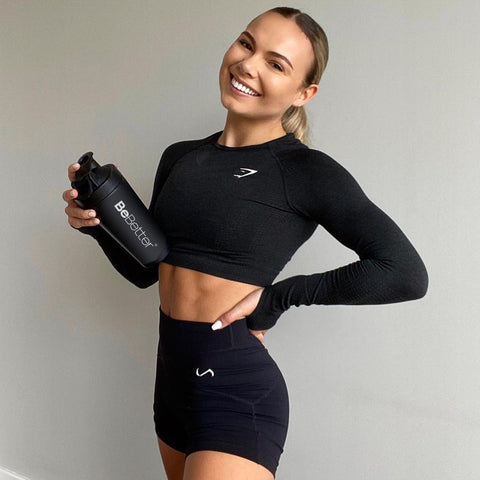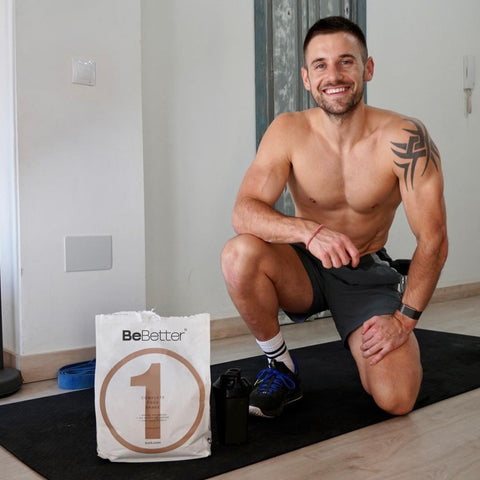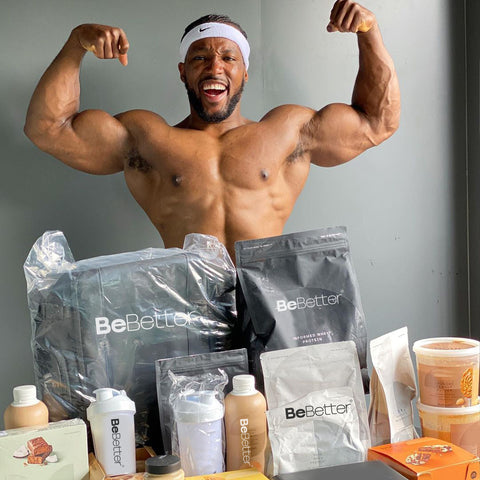1. MOISTURIZE YOURSELF FREQUENTLY
During physical exertion, the body loses water due to the heat produced by the muscles, water expelled through sweat and high body temperature.
As soon as you start working out, you lose fluids through sweat, a vital function because it removes excess heat from the body during exercise, maintaining your core body temperature. But fluid loss can be high – up to 500ml in 30 minutes – depending on how much and how hard you exercise and the temperature and humidity around you. Also, overweight people sweat more, and other people simply sweat more regardless of weight. If you don't replace at least some of the fluids lost through sweat, your core body temperature rises and your cardiovascular system has to work harder than normal. Your blood thickens and your heart starts beating faster to pump blood throughout your body. Losing 2% of your body weight through sweat results in a 10-20% decrease in your performance or aerobic capacity. When you're dehydrated, your workout feels harder, your endurance drops, and you'll feel tired more quickly. It can also lead to more serious situations, such as vomiting and physical exhaustion.
Hydrate frequently and throughout exertion to compensate for these losses. The amount of water to drink depends on the climatic conditions, the distance covered and the intensity of the effort. For a fairly intense physical activity, during the hot season, drink a 500 ml can of water per hour.
2. DRINK IN SMALL AMOUNTS
It is very important to drink fluids in small quantities, from the beginning to the end of the effort. One or two mouthfuls of liquids, every 10-15 minutes, are enough.
Studies recommend drinking 150-350 ml, every 15-20 minutes. It is recommended that you drink fluids as soon as you start your workout because it takes 30 minutes for fluids to be absorbed into the bloodstream.
3. DON'T WAIT TO FEEL THIRSTY
When you feel thirsty, it means that you are already dehydrated. So, you don't have to wait for your body to ask for water, but you have to anticipate this need.
Symptoms of dehydration:
– an unusual lack of energy;
– you get tired too quickly while training;
– you feel overheated;
– the skin turns red;
- you urinate in small amounts of dark yellow color;
– nausea;
– a strong headache;
- dizziness;
– disorientation;
- breathing problems.
Dehydration also affects your strength, not just endurance. Researchers at the University of Virginia tested the strength of 10 athletes when they were dehydrated. The weight they pushed off their chest dropped significantly, by about 6kg, when they were dehydrated compared to when they rehydrated. During training you should consume an amount of fluids as close as possible to the amount of fluids eliminated. Studies from the University of Aberdeen, Scotland, have shown that replacing at least 80% of the fluids lost during training will not affect your sports performance.
4. BEVERAGE AT AMBIENT TEMPERATURE
Choose to drink liquids at room temperature, because too cold water, for example, causes gastric problems. In this case, hydration will no longer be achieved properly.
5. WATER : FOR SHORT-TERM EXERCISES
For most physical activities of up to 1 hour, it is recommended to drink water, one of the best methods of hydration. It is quickly absorbed by the body and keeps you hydrated during training. Water is also cheaper than other sports drinks and can be found in all grocery stores. If you are not used to the taste of plain water, give it some flavor by mixing the water with a small amount of fresh fruit juice. This adds extra sugar, but because it's diluted in water, it won't affect your athletic performance.
6. SWEET WATER AND ISOTONIC DRINKS: FOR LONG-TERM EXERCISES
Carbohydrate-containing drinks - isotonic sports drinks, diluted juice, soft drinks - are more effective than plain water when exercising for more than 60 minutes.
When you exert more intense efforts and over a long period, you need an intake of carbohydrates and minerals to meet the needs of your body.
Water with sugar, water with syrup or honey or isotonic drinks compensate for these energy losses and ensure maximum hydration. Slightly sweetened water stays longer in the stomach before being sent to the small intestine.
The sugars they contain give you fuel for your muscles and speed up the absorption of water in your body. Ideally, you should consume between 30 – 60 grams of carbohydrates per hour, depending on your level of training.
7. STRONG HEAT: YOU NEED SALT WATER
When you practice a sporting activity at very high temperatures, you will sweat a lot and eliminate mineral salts. This loss can be compensated by drinking low salt water and a suitable isotonic drink. Salt speeds up the rate at which water reaches the muscles and retains water in the body.
The amount of fluids should be determined based on how much you sweat during your workout. If you train instantly, in hot conditions, you can expect a loss of 750-1000 ml per hour, so you should consume 600-800 ml. You should set intervals where you drink water in small sips. Studies recommend drinking 150-350 ml, every 15-20 minutes.
8. ALWAYS LISTEN TO YOUR BODY
From the first signs of dehydration (feeling thirsty, heavy legs, difficulty breathing, muscle pain, etc.), drink water! Dehydration could cause your overall physical condition to deteriorate.
Try to drink at least 8 glasses (1.5-2 L) and more on hot days or training days.
It is better to drink small amounts often than to drink large amounts all at once. Take a bottle of water with you wherever you go: to the gym, to work and in the car, as a reminder that you need to hydrate. Drink before you get thirsty!
It is recommended to drink at least 2-4 glasses of water (400-600 ml), 2-3 hours before training.
9. DRINK BEFORE EXERCISE
It is indispensable to hydrate during the effort, but don't forget to drink before the race or your outing in nature! Drink 300 ml of water, little by little, in the 90 minutes before the effort. Thus, you will anticipate future water losses and compensate for a possible poor hydration at the start of the race.
Even mild dehydration can result in fatigue and dizziness because your body fails to cool down, putting more strain on your heart and lungs.
The best strategy is to stay hydrated throughout the day, rather than filling up on fluids right before your workout. Try to make a habit of drinking water regularly. Drink a glass of water in the morning, when you wake up, and set exact times throughout the day when you will drink again.
10. RECOVERY – REHYDRATION
Physical activity causes general and muscle fatigue. Optimal hydration is very important in the recovery process. It is recommended to drink water in the 15-30 minutes following the effort, to renew the reserves consumed.
You can opt for isotonic drinks adapted to recovery. Bicarbonate water is ideal for eliminating acidic waste accumulated during the sports session.



